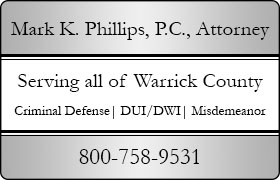Winslow Misdemeanor Lawyer, Indiana
Sponsored Law Firm
-
 x
x

Click For More Info:
-
Law Offices of Mark K. Phillips
114 South Third Street P.O. Box 427 Boonville, IN 47601» view mapDUI-DWI, Criminal Defense, Personal Injury Top Rated Indiana DUI Defense Lawyer
I offer passionate, loyal and fierce representation. I have over 20 years of experience to fight your Indiana DUI charge. I offer a free, initial consultation.
800-291-416 -
- Contact
- Free Consultation
- Visit:
- Website
- Profile
Not enough matches for Winslow Misdemeanor lawyer.
Below are all Winslow Criminal lawyers.
Mark Kelly Phillips
✓ VERIFIED *Status is reviewed annually. For latest information visit hereDUI-DWI, Criminal, Personal Injury, Family Law, Accident & Injury
I am the proud father of three wonderful young men, two of whom are now in practice with me, and the youngest, who is a junior in high school, who hav... (more)
Nathan Verkamp
Criminal
Status: In Good Standing *Status is reviewed annually. For latest information visit here Licensed: 24 Years
Samuel Adam Long
Family Law, DUI-DWI, Criminal, Consumer Protection, Personal Injury
Status: In Good Standing *Status is reviewed annually. For latest information visit here
Bryan Anthony Jewel
Divorce & Family Law, Criminal, Credit & Debt
Status: In Good Standing *Status is reviewed annually. For latest information visit here Licensed: 35 Years
Conor O'Daniel
Wills & Probate, Paternity, Family Law, Criminal
Status: In Good Standing *Status is reviewed annually. For latest information visit here
Kimberly Ottilie
Employment, Divorce & Family Law, Criminal, Bankruptcy & Debt
Status: In Good Standing *Status is reviewed annually. For latest information visit here Licensed: 14 Years
FREE CONSULTATION
CONTACTSteven Keith Deig
Estate, Divorce & Family Law, Criminal, Accident & Injury
Status: In Good Standing *Status is reviewed annually. For latest information visit here Licensed: 47 Years
Marti Collins
Criminal, Personal Injury
Status: In Good Standing *Status is reviewed annually. For latest information visit here
Dane Shields
Real Estate, Wills & Probate, Criminal, Corporate
Status: In Good Standing *Status is reviewed annually. For latest information visit here
Michael Charles Keating
Accident & Injury, Criminal, Estate, Lawsuit & Dispute
Status: In Good Standing *Status is reviewed annually. For latest information visit here Licensed: 48 Years
 Mark K. Phillips Boonville,Indiana
Mark K. Phillips Boonville,Indiana About UsMark K. Phillips
About UsMark K. Phillips Contact UsCall or Email Now
Contact UsCall or Email Now
